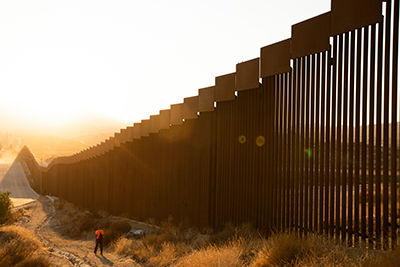Trump’s Border Wall Won’t Normalize Immigration
 Donald Trump’s position on immigration is a major explanation for his victory.
Donald Trump’s position on immigration is a major explanation for his victory.
His nearly unwavering support for harsh immigration enforcement and a border wall fed off of the perception of an immigration system as chaotic and uncontrolled. He depicted a porous border and a large illegal immigrant population in a way that made many Americans feel like they weren’t in control of their country anymore.
Trump’s promise to regain control resonated.
A recent paper by political scientists Allison Harell, Stuart Soroka, Shanto Iyengar explains how lack of control over immigration diminishes support for immigration.
Based on survey data from Canada, the UK, and the U.S., people were more opposed to immigration if they felt like their government was less in control; hence support for a candidate wants to bring it under control.
Only 37 percent of American respondents reported that the government was in control of immigration. According to the control theory, the routine failures at immigration reform in the United States, the rise and election of Trump, and in Britain’s case Brexit come from voters feeling that they don’t control the borders.
In contrast, 52 percent of Canadians think their government is in control of immigration.
Canadians of course aren’t part of a free-movement zone like Britain and they don’t share a long border with a developing country like the United States does.
Feeling in control leads natives to positively view immigration and the economic, social, and demographic changes that come from it. With control, they feel like they are choosing to change rather than being altered against their will. This leads to more support for looser immigration laws.
Canada’s more open immigration system is popular up North, even among conservatives. Australia is another country with an immigration system far more open than the United States with an immigrant population that is twice as high as a percentage of the population. They can maintain that openness in part because of their famously tough policy on refugees who land without permission.
Control breeds confidence which leads to more open immigration.
Facts matter less when people feel out of control. You wouldn’t know it from Trump’s rhetoric, but the flow of illegal immigrants across the border is near a 40-year low. Border patrol is huge and has plenty of resources. The U.S. has an infamously complex and strict immigration system.
But these facts don’t penetrate the perception that the government lacks control over immigration.
The hard truth for Trump voters is that Trump’s proposed solutions to immigration will not increase control. A border wall, deportation force, and mandatory E-Verify will increase the perception of chaos. Illegal immigrants responded to the doubling of border patrol in the 1990s by hiring smugglers and taking boats up the coast to avoid the border altogether.
Fences near border towns pushed illegal crossers from Texas and California toward Arizona. That state reacted furiously to a sudden flow that seemed to come out of nowhere, passing immigration enforcement laws in 2008 and 2010 that sparked protests and a deeper black market.
Chaos seems to reign even though the property and violent crime rates in Arizona were falling during this entire time. In 2010, when Arizona passed its infamous “show me your papers” law in response to the murder of a rancher that was blamed on an illegal immigrant, the violent crime rate was at its lowest point since 1971 and the property crime rate hadn’t been so low since 1965.
A border wall could create calm and project control. On the other hand, it could advertise chaos and focus attention on every breach or circumvention similar to how the Berlin Wall advertised people fleeing to the West. More importantly, it won’t actually stop much illegal immigration. The only way to actually control the border is to liberalize legal immigration. Doing so will create a legal market by driving would-be illegal immigrants into the legal system.
The great Catch-22 of immigration policy is that only through more liberal immigration policies will Americans ultimately feel like their government is in control. Increased enforcement will likely exacerbate perceptions of chaos.








